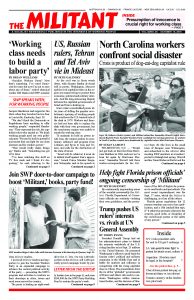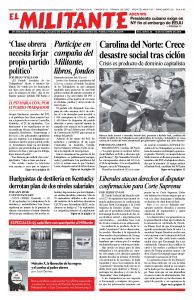President Donald Trump laid out his administration’s plans to defend the interests worldwide of the U.S. ruling families in his Sept. 25 address to the United Nations. He presented Washington’s efforts to push back the Iranian rulers’ political and military expansion in the Middle East and to battle for markets and influence in competition with the rising capitalist class in China. His presentation drew the ire of the “globalist” governments of France and others who seek to constrain Washington within international bodies, and the derision of like-minded liberal opponents at home.
Despite being its largest donor, the U.S. rulers have less use for the U.N. today than when they emerged as the victor from the second imperialist world war and founded it with their allies. In 1944 the heads of state of the U.S., U.K. and USSR met, along with the Chiang Kai-shek government of China, to devise a postwar structure that would give preponderant influence to Washington and its allies.
Russian revolutionary leader V.I. Lenin described the U.N.’s predecessor, the League of Nations, as a “den of thieves” to aid the U.S. rulers and other imperialist powers in their drive for markets and profits and to defend them from revolutionary challenge by working people.
The U.N. was never “neutral.” It was used by the U.S. rulers for decades as cover for its predatory wars abroad. With the complicity of Joseph Stalin, Washington got U.N. backing for its 1950-53 “police action” that leveled most of Korea, killing hundreds of thousands. But they were fought to a standstill, in U.S. imperialism’s first military defeat.
The slaughter inflicted on the Iraqi people by Washington and its allies in 1991 was organized with U.N. backing.
Neither has the U.N. moderated violent clashes between the 193 rival powers now under its jurisdiction, as its founders claimed it would. These conflicts and wars are inherent to the imperialist system and cannot be quelled by so-called “globalist” institutions. Under capitalist rule there can never be a “united nations.” The weaker imperialist competitors of Washington hoped the U.N. could be a way to “regulate” their battles with Washington, but that’s impossible as well.
Washington sees the U.N. — like NATO and a number of other multilateral alliances and institutions — as less useful in its efforts to reach agreements and assert its power worldwide. While the U.S. rulers’ strength is declining, it is still the most powerful imperialist power. Its European rivals are in crisis as their EU is coming apart under the blows of member capitalist rulers’ clashing needs and interests.
Trump defended his decision to pull out of the U.N.-endorsed 2015 Iran deal that European capitalist rivals claim to be “international law,” and reimpose sanctions that will fall hardest on working people. The capitalist government in Iran has refused talks with Washington, for the time being. In addition to the squeeze on their economy, Iran’s capitalist rulers face Israeli attacks against their efforts to strengthen Hezbollah in Syria; protests by working people in southern Iraq against the influence there of hated Tehran-backed militias; and widespread working-class unrest across Iran.
In practice, profit-driven bosses among Washington’s rivals are winding down their operations in Iran. They fear losing access to the huge U.S. capitalist market and to a world financial system dominated by the U.S. rulers.
The U.S. president castigated the capitalist-minded rulers in China, as part of Washington’s determined efforts to contain their growing competition. He defended Washington’s recent tariffs on Chinese firms, saying he was defending “our companies” and “our workers.”
In reality his protection of the bosses always comes at the expense of workers in both the U.S. and in China. Workers share common interests that can only be advanced in struggle against the bosses and their governments, not in collaboration with them. Gains made by U.S. bosses just make them stronger, more determined to boost profits at the expense of workers.
Washington steps away from U.N. bodies
Stirring the wrath of his European competitors, and of the liberal press at home, Trump defended his administration’s decision to withdraw from the U.N.’s Human Rights Council and reiterated Washington wouldn’t recognize its International Criminal Court. The administration refuses to nominate judges to the U.N.-backed World Trade Organization, blocking it from functioning, including taking up recent U.S. tariffs.
French President Emmanuel Macron drew applause from the U.N.’s General Assembly when he rebuked Trump’s comments. He claimed the president was weakening the “international order,” on a course that could lead to “global war.”
“Do not accept the erosion of multilateralism’” he exhorted. But the utopian course Macron defends is simply what he sees as the only way to defend French capitalists’ interests against Washington’s moves today.
The White House’s course is winning ruling-class support, as he uses Washington’s economic weight and military superiority to force “deals” on rivals worldwide.
At the same time, the unintended consequences of Washington’s moves in Korea and elsewhere, seeking to tamp down the threat of military explosions and advance denuclearization of the Korean Peninsula, create better conditions there, in Japan and Asia, and beyond, for working people to organize and advance common struggles.

